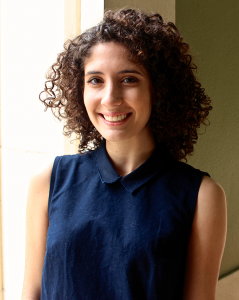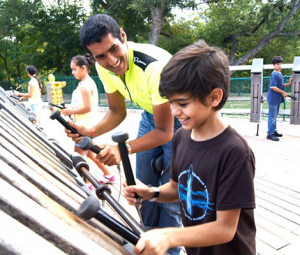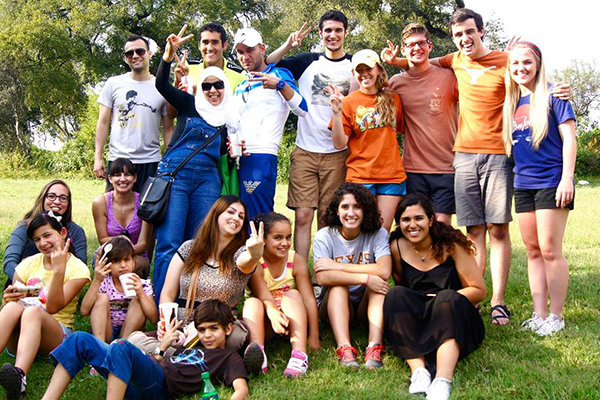Sarah Fischer is an international relations & global studies and journalism sophomore from Mechanicsville, Maryland. She is a founding member of the Liberal Arts Refugee Alliance, which started last spring with grant from the Liberal Arts Honors program.
How did the Liberal Arts Refugee Alliance come about?

Last Spring, I attended a volunteer orientation at Refugee Services of Texas, along with a few other Liberal Arts students from UT. It was apparent that the refugees settled in Austin were an under-served population, and the staff of the settlement agency lacked the time and resources to help refugees explore and connect to the Austin community. Realizing this need, a group of us proposed the creation of the Liberal Arts Refugee Alliance. The goal was to provide a network of student volunteers to support Austin’s refugee population and to help them to discover what is available to them in Austin.
Our proposal was entered into the Envision Austin – Social Innovation Challenge sponsored by the Liberal Arts Honors program. The challenge, introduced for the first time last year, encourages students to identify problems in the Austin community and create innovative solutions to those problems. Our project was awarded “Most Impactful Idea” and with our $1,000 grant, we created the Liberal Arts Refugee Alliance. The organization has grown to include 60 volunteers in its second semester.
What kind of work do LARA volunteers do?
They support bi-monthly events that introduce refugees to the Austin area and weekly volunteer missions, such as language training and mentoring programs, with other organizations that work with Austin’s refugee population.
How has working with the alliance impacted you?
It’s made me realize how important it is for my future work to always involve an aspect of social good. Being able to enact positive change in others’ lives has reminded of the reason I chose to study journalism and international relations in the first place. I have realized through my volunteer work with LARA that I need a purpose and reward greater than my degree and GPA to sustain me throughout college. That knowledge has brought so much more passion into my life.
Are there any stories that stick with you?
 One of the best experiences I have had working with Liberal Arts Refugee Alliance was last October when LARA volunteers took two families of refugees to Zilker Park for a picnic. The families had lived in the United States for only a few months since leaving Iraq. Watching their children splash and play in water for the first time and enjoying the food the families had specially prepared for us was a treat.
One of the best experiences I have had working with Liberal Arts Refugee Alliance was last October when LARA volunteers took two families of refugees to Zilker Park for a picnic. The families had lived in the United States for only a few months since leaving Iraq. Watching their children splash and play in water for the first time and enjoying the food the families had specially prepared for us was a treat.
The most rewarding part of the experience was when one of the mothers exclaimed that it had been the best day since they had come to the United States. I thought that moment really showed how important it was that our organization helped give refugees the opportunity to meet new people, have fun with their kids and explore their new home.
What are your post-graduation plans?
Upon graduation from UT, I would like to continue study international relations at the graduate level. In the future, I want to investigate and report on humanitarian crises around the world. It is my belief that for people to begin caring about such issues, they first need to be well informed. I want to accomplish this as a knowledgeable journalist.
Why do you think studying liberal arts is important?
I think a liberal arts education gives students the skills to be activists and explorers in their own lives. Whether a student wants to be a writer, a politician or a doctor, liberal arts allows students to pursue their passions and teaches them invaluable communication skills. The most important aspect of studying liberal arts is the knowledge we gain about ourselves in relation to others and the world. In choosing our niche in liberal arts, we decide in what way we want to shape the world.
Liberal Arts Refugee Alliance meetings are held every other Thursday at 7 p.m. in Waggoner 214. For more information, visit the Facebook page.
